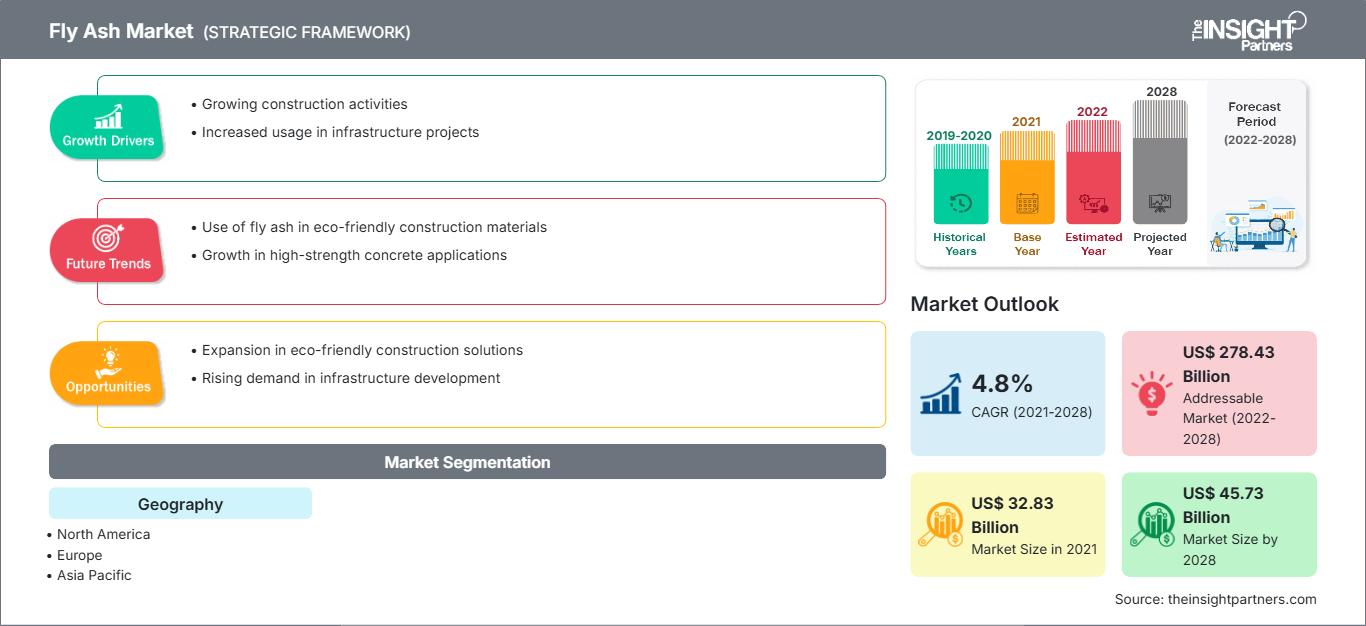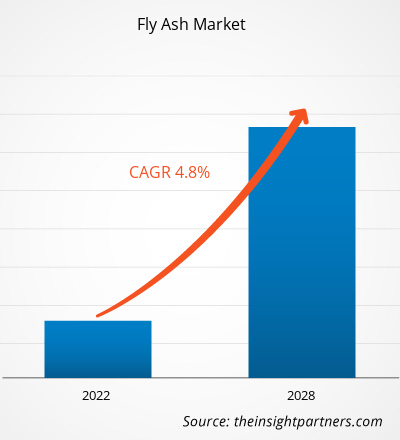[Research Report] The fly ash market was valued at US$ 32.83 billion in 2021 and is projected to reach US$ 45.73 billion by 2028; it is expected to grow at a CAGR of 4.8% from 2021 to 2028.
MARKET ANALYSIS
Fly ash is produced as a residue in combustion and contains fine particles such as silicon dioxide, aluminum oxide, ferric oxide and sometimes calcium oxide. It is a fine gray powder that has pozzolanic properties and it can react with lime to form cement compounds. They are used in a wide range of applications such as cement and concrete mixing, mines and dams, landfills, geopolymer concrete among others. It improves the performance of the concrete upon mixing and also acts a catalyst for converting polyethylene during pyrolysis.
GROWTH DRIVERS AND CHALLENGES
Constant growth in construction industry is boosting the global fly ash market growth significantly. Asia Pacific countries, such as the US, China, India, have the largest construction in the world. The high rate of construction activities creates an enormous demand for various construction materials. Fly ash is utilized in multiple construction-specific applications, such as cement, concrete, bricks, and blocks. There is increasing use of fly ash for a variety of applications in the construction industry. Moreover, increasing use of fly ash in various applications is further boosting the global fly ash market growth. Fly ash is used in various applications such as cement and concrete, block and brick, mining, fills and embankments, many others. Due to its pozzolanic feature, the use of fly ash in concrete is quite beneficial, as it improves concrete's durability. In the manufacturing of Portland cement concrete, fly ash is utilized as a supplementary cementitious material (SCM) to improve the performance of this concrete. Fly ash bricks are used as a building material in place of clay bricks. Compared to traditional clay bricks, fly ash bricks are lighter and more robust, are low-cost, do not require plaster, and can help reduce building expenses and soil erosion. However, lack of awareness about the benefits or potential uses of fly ash, might limit its market growth. Fly ash is an important raw material for several applications. However, there is a lack of understanding of the chemistry of fly ash and its derivatives to be used in appropriate end-applications. The lack of public awareness about the products is one of the causes of the low utilization of fly ash.
Customize This Report To Suit Your Requirement
You will get customization on any report - free of charge - including parts of this report, or country-level analysis, Excel Data pack, as well as avail great offers and discounts for start-ups & universities
Fly Ash Market: Strategic Insights

-
Get Top Key Market Trends of this report.This FREE sample will include data analysis, ranging from market trends to estimates and forecasts.
REPORT SEGMENTATION AND SCOPE
The "Global Fly Ash Market Analysis to 2030" is a specialized and in-depth study with a major focus on the global fly ash market trends and growth opportunities. The report aims to provide an overview of the global fly ash market with detailed market segmentation by type, application, and geography. The global fly ash market has been witnessing high growth over the recent past and is expected to continue this trend during the forecast period. The report provides key statistics on the consumption of fly ash worldwide along with their demand in major regions and countries. In addition, the report provides the qualitative assessment of various factors affecting the fly ash market performance in major regions and countries. The report also includes a comprehensive analysis of the leading players in the fly ash market and their key strategic developments. Several analyses on the market dynamics are also included to help identify the key driving factors, market trends, and lucrative fly ash market opportunities that would, in turn, aid in identifying the major revenue pockets.
Further, ecosystem analysis and Porter’s five forces analysis provide a 360-degree view of the global fly ash market, which helps understand the entire supply chain and various factors affecting the market growth.
SEGMENTAL ANALYSIS
The global fly ash market is segmented on the basis of type, and application. Based on type, the fly ash market is segmented as, type C, and type F. On the basis of application, the market is classified as, cement and concrete, block and brick, mining, road stabilization, fills and embankments, waste stabilization, and others. Based on type, the type C segment accounted for a major fly ash market share which can be attributed to the increasing use of fly ash in various applications. Type C fly ash is often obtained from sub-bituminous and lignite coal. Type C fly ash's distinctive self-hardening properties are due to its high quicklime (CaO) concentration. Type C fly ash is best for performance blends, pre-stressed applications, and other applications that require greater early strengths. Type C fly ash is very effective in soil stabilization, owing to its high lime content. Based on application, the cement and concrete segment accounted for a major fly ash market share which can be attributed to the rising adoption of fly ash in the construction sector. Fly ash is utilized as a supplementary cementitious material (SCM) to manufacture Portland cement concrete. Compared to Portland cement concrete of the same workability, the use of excellent quality fly ash with high fineness and low carbon content reduces the water demand of concrete. As a result, fly ash should allow the concrete to be produced at a lower water content. This will further attract new growth opportunities for the overall industry growth.
REGIONAL ANALYSIS
The report provides a detailed overview of the global fly ash market with respect to five major regions, namely; North America, Europe, Asia-Pacific (APAC), Middle East and Africa (MEA) and South & Central America. Middle East & Africa accounted for a significant share of the market and valued at more than US$ 600 million in 2022 and estimated to reach approximately US$ 1,000 million in 2030. Rapid increase in construction activities, especially in Middle East, positively contributed to the market growth in Middle East & Africa. Asia Pacific is also expected to witness considerable growth valued at over US$ 25,000 million in 2022, attributed to increasing use of fly ash in various applications in the region is driving global fly ash market growth. North America is also expected to witness considerable growth valued at over US$ 4,000 million in 2022, attributed to the increased usage of fly ash in construction industry is expected to boost the global fly ash market growth.
INDUSTRY DEVELOPMENTS AND FUTURE OPPORTUNITIES
Partnership, acquisitions and new product launches were found to be the major strategies adopted by the players operating in the global fly ash market.
- In November 2021, LafargeHolcim in the US, Geocycle and CenterPoint Energy to recycle power-plant coal ash from landfill for use in cement manufacturing.
- In September 2021, Charah Solutions Awarded 5-Year Fly Ash Sales and Marketing Contract for Beneficial Use of Production Fly Ash at Gavin Power Plant in Ohio.
IMPACT OF COVID/IMPACT OF GEOPOLITICAL SCENARIO/IMPACT OF RECESSION
The COVID-19 pandemic led to a decline in the progress of many industries across the globe. Shutdown of manufacturing plants and restricted trade across the globe led to supply chain constraints for the manufacturers across the globe. The ongoing pandemic has drastically altered the chemicals & materials sector's status and negatively impacted the fly ash market's growth. The implementation of measures to combat the spread of the virus has aggravated the situation and impacted the growth of several industrial sectors. Many of the thermal power plants were not operational or operating at a lower capacity. This has negatively impacted fly ash generation and utilization. The pandemic has created a global health crisis that has disrupted all industries, including the construction industry. Reduced economic activity has resulted in less demand for new commercial or industrial facilities. Loss of income and lack of consumer confidence have negatively affected the demand for housing construction. Also, the construction sites have faced disrupted supply chains and operational restrictions. However, as the economies are planning to revive their operations, the demand for fly ash is expected to rise globally. Therefore, the fly ash market has recovered quite well from the aftermath of the pandemic and is expected to grow over the coming years.
Fly Ash Market Regional InsightsThe regional trends and factors influencing the Fly Ash Market throughout the forecast period have been thoroughly explained by the analysts at The Insight Partners. This section also discusses Fly Ash Market segments and geography across North America, Europe, Asia Pacific, Middle East and Africa, and South and Central America.
Fly Ash Market Report Scope
| Report Attribute | Details |
|---|---|
| Market size in 2021 | US$ 32.83 Billion |
| Market Size by 2028 | US$ 45.73 Billion |
| Global CAGR (2021 - 2028) | 4.8% |
| Historical Data | 2019-2020 |
| Forecast period | 2022-2028 |
| Regions and Countries Covered |
North America
|
| Market leaders and key company profiles |
|
Fly Ash Market Players Density: Understanding Its Impact on Business Dynamics
The Fly Ash Market is growing rapidly, driven by increasing end-user demand due to factors such as evolving consumer preferences, technological advancements, and greater awareness of the product's benefits. As demand rises, businesses are expanding their offerings, innovating to meet consumer needs, and capitalizing on emerging trends, which further fuels market growth.

- Get the Fly Ash Market top key players overview
COMPETITIVE LANDSCAPE AND KEY COMPANIES
Some of the key players operating in the fly ash market include, include Boral LTD., Cemex S.A.B. DE C.V., Lafargeholcim Ltd., Waste Management, Inc., Charah, LLC, Separation Technologies LLC, Cement Australia PTY Limited, Salt River Materials Group, Ashtech India Pvt. Ltd., and Duromar, Inc. among others.
Frequently Asked Questions
Based on application, which segment is leading the global fly ash market during the forecast period?
Can you list some of the major players operating in the global fly ash market?
Which region held the largest share of the global fly ash market?
Based on type, which segment is leading the global fly ash market during the forecast period?
Based on application, which segment is the fastest growing segment in the global fly ash market?
Which region held the fastest CAGR in the global fly ash market?
- Historical Analysis (2 Years), Base Year, Forecast (7 Years) with CAGR
- PEST and SWOT Analysis
- Market Size Value / Volume - Global, Regional, Country
- Industry and Competitive Landscape
- Excel Dataset
Recent Reports
Testimonials
Reason to Buy
- Informed Decision-Making
- Understanding Market Dynamics
- Competitive Analysis
- Identifying Emerging Markets
- Customer Insights
- Market Forecasts
- Risk Mitigation
- Boosting Operational Efficiency
- Strategic Planning
- Investment Justification
- Tracking Industry Innovations
- Aligning with Regulatory Trends





















 Get Free Sample For
Get Free Sample For